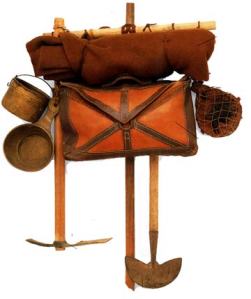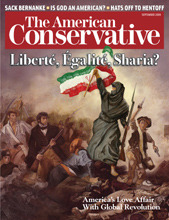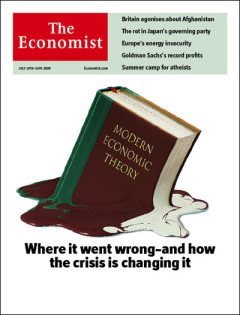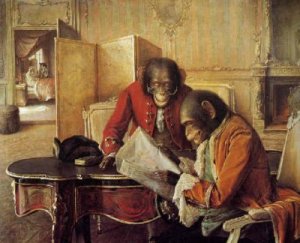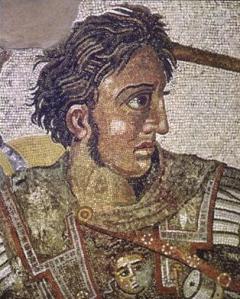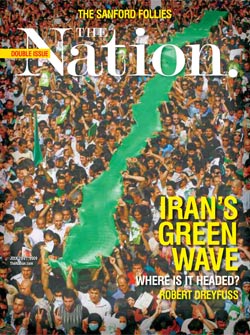
I've fallen far behind my usual pace in sharing my "Periodicals Notes"; that pesky offline part of the world keeps distracting me with things like work, family, etc etc. There's a great deal of work I ought to be doing right now, as a matter of fact, but I can't resist taking time to note a couple of pieces in the latest issue of The American Conservative. As you can see from the cover illustration, the magazine's contributors generally oppose official recognition of homosexual unions, holding that marriage is an institution that must be reserved for one elephant and one statue, and solemnized by a self-certified ophthalmologist.
I've long been puzzled by the low quality of arguments offered against same-sex marriage. Opponents have had a great deal of time to come up with reasons why only opposite sex couples should be allowed to marry. Their position is broadly popular, and they have at their disposal the resources of major religious organizations, conservative think-tanks, and much of the press. You'd think that with all that on their side, they would be able to produce an argument that would be at least superficially plausible. Yet, when asked to defend their position, supporters of the status quo trot out arguments that are so feeble they inspire, not even laughter, but sheer pity. At the outset of his article in this issue, "Stonewalling Marriage,*" Justin Raimondo describes the situation with admirable clarity:
Opponents of same-sex marriage have marshaled all sorts of arguments to make their case, from the rather alarmist view that it would de-sanctify and ultimately destroy heterosexual marriage to the assertion that it would logically lead to polygamy and the downfall of Western civilization. None of these arguments—to my mind, at least—make the least amount of sense, and they have all been singularly ineffective in beating back the rising tide of sentiment in favor of allowing same-sex couples the “right” to marry.
Raimondo goes on to offer what the cover advertises as "A Libertarian Case Against Gay Marriage." Indeed, it would be difficult to imagine a statement more typical of libertarianism than these paragraphs:
Of course, we already have gay marriages. Just as heterosexual marriage, as an institution, preceded the invention of the state, so the homosexual version existed long before anyone thought to give it legal sanction. Extending the authority of the state into territory previously untouched by its tender ministrations, legalizing relationships that had developed and been found rewarding entirely without this imprimatur, would wreak havoc where harmony once prevailed. Imagine a relationship of some duration in which one partner, the breadwinner, had supported his or her partner without much thought about the economics of the matter: one had stayed home and tended the house, while the other had been in the workforce, bringing home the bacon. This division of labor had prevailed for many years, not requiring any written contract or threat of legal action to enforce its provisions.
Then, suddenly, they are legally married— or, in certain states, considered married under the common law. This changes the relationship, and not for the better. For now the property of the breadwinner is not his or her own: half of it belongs to the stay-at-home. Before when they argued, money was never an issue: now, when the going gets rough, the threat of divorce—and the specter of alimony—hangs over the relationship, and the mere possibility casts its dark shadow over what had once been a sunlit field.
Who finds libertarianism appealing? This passage might suggest two groups. First, there are people who have known many couples who lived together for a long time, then married, only to go through a calamitous divorce shortly afterward. I suppose most Americans under the age of 60 could name at least a dozen such couples among their personal acquaintances. When I've seen the sequence long cohabitation/ brief marriage/ bitter divorce, I've always tended to explain the marriage as a desperate attempt to put some life back into a failing relationship. But some might look at the sequence differently, and wonder whether the relationships would have continued had the partners not ventured into the dread precincts of matrimony. Elsewhere in the issue, a piece* is built around the observation that young Americans tend to take many Libertarian ideas for granted; perhaps the changes in family structure that have shaped the lives of so many in recent generations have been part of the reason for this intellectual climate. Second, there are people who hold power in their relationships with others because they control economic resources on which those others depend. Some such people acknowledge the responsibilities that come with such power. Others not only refuse to accept those responsibilities, but do not like even to admit that they are in a position of power at all. For them, "money was never an issue," when the other parties in their relationships simply submitted to their will as regards it. Once those parties gain a share in the control of those resources as a matter of right, suddenly the terms of the relationship must be negotiated, not decreed by the "breadwinner." From the viewpoint of the deposed "breadwinner," this development might very well look like a departure from a "sunlit field" of liberty to the "dark shadow" of conflict, but the newly empowered "stay-at-home" may see matters quite differently.
Of course, it isn't only in the relationship between income-earners and their non-employed partners that one holding economic power may deny the existence of that power and see only the prospect of conflict when a subordinate acquires an independent standing. Employers often pretend that they are on an equal footing with their employees, and denounce trades unions as monstrous powers which bring disharmony into what would otherwise be an idyll of brotherhood. A fine example of this sort of thing can be found in this issue, in Peter Brimelow's "Less Perfect Unions," which denounces American schoolteachers for organizing their profession. When Raimondo reaches the heart of his argument against same-sex marriage, he presents a case that will be familiar to anyone who has followed the arguments gay liberationists have made over the years. Same-sexers, he argues, simply do not need "to entangle themselves in a regulatory web and risk getting into legal disputes over divorce, alimony, and the division of property." Opposite sex couples may believe that their shared interest in any children they may produce justifies such "entanglement"; Raimondo doesn't agree with them, but in deference to their assessment of their needs he stops short of the gay liberationist cry of "Smash the Family! Smash the State!," and does not call for the end of official recognition of opposite sex unions. He does take a page from the gay liberationist handbook, though, when he argues that same-sex marriage threatens to "take the gayness out of homosexuality." "By superimposing the legal and social constraints of heterosexual marriage on gay relationships, we will succeed only in de-eroticizing them." Raimondo extols the gay liberation movement of the late 1960s and early 1970s for its anti-state focus, and insists that the lack of official sanction and the formalization that goes with it have made homosexuality itself a force to resist the modern state. Same-sex marriage, Raimondo argues, would rob homosexual relations of their anarchic character, and reconstitute them as a pillar of the established order. Why, then, has the demand for gender-neutral marriage become central to the role of same-sexers in US politics? Raimondo has a theory:
The homosexual agenda of today has little relevance to the way gay people actually live their lives.
But the legislative agenda of the modern gay-rights movement is not meant to be useful to the gay person in the street: it is meant to garner support from heterosexual liberals and others with access to power. It is meant to assure the careers of aspiring gay politicos and boost the fortunes of the left wing of the Democratic Party. The gay marriage campaign is the culmination of this distancing trend, the reductio ad absurdum of the civil rights paradigm.
The modern gay-rights movement is all about securing the symbols of societal acceptance. It is a defensive strategy, one that attempts to define homosexuals as an officially sanctioned victim group afflicted with an inherent disability, a disadvantage that must be compensated for legislatively. But if “gay pride” means anything, it means not wanting, needing, or seeking any sort of acceptance but self acceptance. Marriage is a social institution designed by heterosexuals for heterosexuals: why should gay people settle for their cast-off hand-me-downs?
It seems a bit indecent to quibble with the content of so impassioned a peroration, especially considering that the issue is a more personal one for a same-sexer like Raimondo than it is for me. However, I would point out that he is shifting his ground here. Earlier, he had claimed that marriage evolved spontaneously among heterosexuals, who improvised various means of ensuring their interest in their children would be recognized. To the extent that the institution was "designed," that design came after the state intervened in this evolution and hijacked it to serve its own purposes. Now, he implies that marriage is suitable for heterosexuals after all, but not for homosexuals. This shift is important, because it shows him backing away from liberationism and its implication that people should discard the labels they wear, band together, and create a world free of the old restrictions. It leaves him all too much at home under the banner of "American Conservative."
*Sorry, subscribers only
